There has been a little back and forth about metro districts on next door revealing a knowledge gap. Here are some of the basics with reference to the actual documents.
For more in depth information here is a recent analysis prepared for the City of Lakewood (similar evaluations were prepared for Longmont and Denver and Aurora) and a collection of the comprehensive Denver Post research:
Metro Memo Lakewood June 11, 2020 2
Denver Post Special District Series Plus Commentaries and Letters to the Editor
1. Metro districts were originally created to provide a group of residents with a way to pool their resources and build something – like a dam or roads or irrigation systems. People living in a geographic area agreeing with each other to tax themselves to build something. Recent examples include the football stadium or the Denver entertainment district.
2. In the 1980’s some developers and their attorneys came up with a new idea to shift the risk of loss from them to future residents. (Discussed during the ULI seminar 2020). They persuaded the state legislature to adopt amendments to the metro district law to do something very novel – create metro districts where there are no people.
Since there are no people, the developer will “agree” with himself to impose taxes to build something and “agree” with himself that the future residents shall pay those bills with taxes and “agree” with himself that the new residents should have no say in any of the decisions about taxes and bond debt.
3. The developer community got away with this obviously unconstitutional process because – there was no one around to object – and those who should have objected – our “elected” representatives – went along to get along with the well financed development community.
3. Not only is the process (taxation without representation) obviously wrong, it is also an exception – not the rule – for financing the construction of infrastructure.
In most parts of the country, and up until the 1980’s in Colorado, developers pay for the infrastructure and their profits (and the cost of the land) through the cost of the lot. When you buy a house on a lot or a bare lot you are paying for the cost of the land, the cost of the infrastructure built by the developer and the developer’s profit. In Longmont it has always been that way except for one year, 2019. Before and now after 2019, residential metro districts are prohibited in Longmont.
4. It appears clear, since the developers aren’t giving away the lots, that they still include the cost of the infrastructure, the cost of the land and their profit in the cost of the lot.
So, what does the metro district tax pay for – it appears to be pure profit. I am aware of a conversation involving a prominent developer and leading special district law firm where the attorney told the developer he could more than double his profits by using a metro district.
5. The normal marketplace checks and balances are eliminated with a metro district. The metro district guarantees (through taxes) a payout which is only limited by the number the developer puts in the documents – it is a blank check with zero oversight – zero check and balance.
Neither the state or the city looks at the developer’s books, income and expenses on infrastructure the same way a loan officer would. In Solterra’s case the developer told the city it would cost $34 million to pay for the infrastructure. The developer later told the residents $160 million. There is no check and balance – they can use whatever number they want to.
6. There are three key documents the developer uses. None are disclosed to the potential homebuyers even though they are readily available to the developer. Information from the documents is also purposefully not disclosed to the homebuyer at any time.
For example, in Solterra, the total “limit” for financing the developer debt is $4.9 billion. You won’t find that number in the closing documents. But it is in the bonds – assuring the bond investors that Solterra is good for the money because they “agreed” when there were no residents to go into debt up to $4.9 billion.
There is a “loan” from the developer to the residents at 6% interest. You won’t find that in any of the closing documents.
Residents are paying over $2 million a year for at least 30 years just to pay developer debt. They knew that number before they started selling houses but it was never in any closing documents.
And, for 11 years the developer told the residents they could not serve on the boards until the development was 75% built out. Under the statute, the residents could serve on the board the instant they had a contract on the house. The right to serve on the boards was also hidden by the developer.
And because, according to the developer, “no one wanted to serve on the boards” – because the developer told them they couldn’t – the public elections were cancelled for 11 years – until the recall in 2017.
7. The three key documents are the ballot issue, the service plan and the “agreements”.
8. The ballot issue for Solterra is here:
As you can see, 8 employees of Brookfield “voted” to do two critical things.
First, the 8 employees voted to eliminate the right of future homeowners to vote on taxes and bond debt.
They gave that right to the board – which of course Brookfield controlled by telling people they could not serve on the board.
We get that right to vote back the same way it was taken away – with a vote – but now not just 8 employees of Brookfield. Now, the voters are over 2,000 residents of Solterra. They have a right to vote on a new ballot issue to repeal the Brookfield ballot issue – and reinstate the right of the residents to vote on taxes and bond debt.
But the Solterra Board won’t put it on the ballot. Since citizen initiatives don’t apply to metro districts (the developer/lawyers left that out of the law in the 1980’s), the board is the only one who can put that issue on the ballot – and they refuse.
Second, the ballot issue sets “limits” on the amount the board can go into debt “on behalf” of the residents. The limits are not limits at all – they are so high they constitute blank checks. The total limit for financing debt is $4.9 billion. That number is repeated in the bonds. The latest bond is here:
So, according to the ballot issue 8 employees of Brookfield voted for in 2006, the Solterra Board can go into debt that will ultimately cost us a maximum of $4.9 billion.
We reverse that power in the same way. Brookfield employees voted to do it in 2006. 2,000 actual residents can vote in 202o to un do it. Just as simple as casting a vote – yes or no – on passing a new, resident, ballot issue – repealing the 2006 ballot.
9. The second document is actually two documents. The “agreements“. The entire argument used by Brookfield and its supporters – who are loud on next door and all opposed the 2017 recall – is that we are required by law to pay Brookfield whatever they say we owe. Mr. Martin campaigned (and lost) on the message “be afraid of Brookfield”. Based upon two agreements.
Problem is, these two agreements are unenforceable as a matter of law because they are single party agreements where the single party – the developer – had an obvious conflict of interest with the residents.
I can’t, as a matter of law, agree with myself that my neighbor must pay the cost of building my deck. It is unenforceable.
Here is a Colorado Court of Appeals decision that says just this:
https://www.courts.state.co.us/Courts/Court_of_Appeals/Opinion/2017/15CA1956-PD.pdf
At page 19, the Court explained:
“Second, the evidence of bad faith is substantial. We recognize, as the District has pointed out, that in the early stages, special district boards are generally made up of the developer’s representatives. But the representatives, when serving in their capacities as board members, may not take actions based on their own self-interests as the developer. See Geudner, 786 P.2d at 436-37. . . . In other words, the Developer spoke for the District and the District acted for the Developer. . . . The District’s circumvention of the statute reinforces our view that the condemnation proceedings were undertaken in bad faith.”
The first agreement says District 1 will pay all the expenses of the developer. The second agreement says Districts 2 and 3 will pay all the expenses of District 1.
Here is the first page and signature page of both agreements. Note that the same person – the same person – signed as both the developer and as the district (representing the future residents).
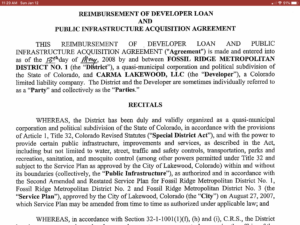
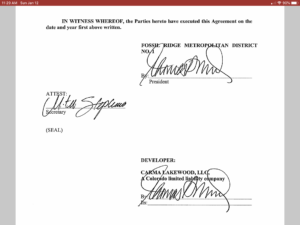
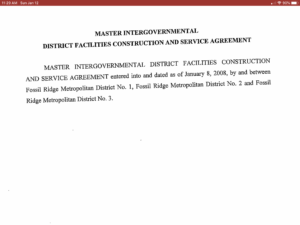
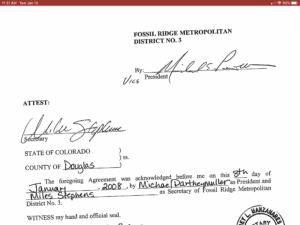
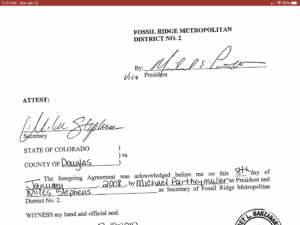
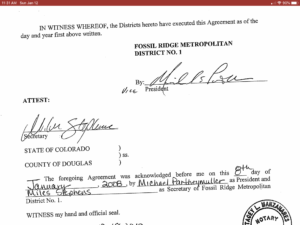
The way to set aside these “agreements” is to simply tell Brookfield that the agreement they are using as the basis for the “debt” are unenforceable. One sentence. And, that we as a community will enter into a separate agreement – between Brookfield and the actual residents – to pay only what is owed – AFTER an independent forensic financial audit to establish what was paid for each lot, the actual cost of the land (we paid for the land with the 21 mill levy from Mt. Carbon), the actual cost of the infrastructure (established by independently verified data), the profit, and then what they spent the first bond debt of $29 million on.
And, if we owe anything (may turn out Brookfield owes us – that the $29 million in bonds issued when they controlled the boards overcharged the residents) – we can then decide whether or not we want to pay with two levels of interest or pay another way.
Brookfield and their attorneys know these agreements are unenforceable. They won’t risk losing this issue by trying to enforce the agreements in front of a judge. Their attorneys admitted as much during two separate exchanges during the Special District Association Annual meeting last year. The Solterra Board knows the agreements are unenforceable. They made the same argument recently in litigation with one of Brookfield’s vendors (Brookfield “stiffed” one of their vendors and the vendor sued us). And Brookfield paid up rather than try to argue to a judge that the agreement was enforceable.
These agreements aren’t “law”. They are simple agreements – unenforceable agreements not worth the paper they are printed on – because there was only on person making an agreement with himself. Not with us.
10. The third document is the Service Plan. This is the only one of the three documents ever disclosed to anyone and it was only disclosed to the city at the time the developer applied for a special district.
Until recently, the city had no idea of the obligation they have under the statutes to oversee and regulate the operation of metro districts. They are just now considering a new ordinance to either prohibit residential metro districts or aggressively regulate their operation to prohibit the abuses experienced in Solterra. They held the first study session a few weeks ago. Here is a link to that session:
Again, here is a comprehensive evaluation of the issues related to Lakewood’s regulation of special districts:
Metro Memo Lakewood June 11, 2020 2
The Service Plan sets a “limit” of 50 mills. We will only be taxed 50 mills – but there is no limit on how long we will pay 50 mills under the bond issues. If the market goes down, and the 50 mills doesn’t pay the full interest and principal on the bond, the interest keeps building and we keep paying – until we max out at $4.9 billion.
And the 5o mill limit is not quite accurate. Right now we actually pay 64 mills – 43 for the developer debt and 21 to Mt. Carbon – a tax on the residents that the developer used to pay for the land.
The most important point here is that the most effective check and balance on the abuse of metro district power is you, me, us. We are the voters. We vote on ballot issues. We vote on our representatives. We vote to recall our representatives. We are the check and balance.
We can’t rely on the city or the state or the board as the check and balance. We are a nation built on checks and balances. President, Congress, Supreme Court – repeated at the state level. And the ultimate check and balance in all cases is us – the voters.
We keep an eye on things and when our representatives get out of line, we change things – with the most powerful weapon in the world – our vote.
That is why we have the recall power.
And if we place the ballot issues on the November ballot – there is no significant charge – we get a “free ride” since the county is already having an election – a national and state election.
And if our representatives make decisions in secret. If they fail to be transparent (Libby Anglin ran on live streaming and video taping every meeting – that was suppressed by Mr. Waterman and one attempt to video tape was severely criticized by Mr. Mcgraw). If they refuse to answer residents’ questions. If they refuse to put resident ballot issues on the ballot. If they refuse to allow the residents to exercise their right under the Colorado Constitution to vote on their own taxes and bond debt.
Then it is time to replace them with residents who will represent the residents, not Brookfield. With a vote.
We did not give Brookfield a blank check. Neither did we give our neighbors a blank check. We shouldn’t have to ask to restore our right to vote. It should have been returned automatically.
And if we all get to vote, we all win.
So, lets keep the dialogue going – focused on the issue. Don’t focus on the fact that some of the Next Door speakers are employed by developers. Don’t focus on the fact that these same speakers have worked Next Door to censure people from next door simply because they don’t agree with them. Don’t focus on the fact that some of the speakers opposed the recall in 2017. Don’t focus on the fact that at least one speaker first opposed car lots at Dinosaur Ridge, then reversed herself and supported car lots at Dinosaur Ridge and then when she lost reversed herself again and tried to take credit for Jeffco’s decision against car lots at Dinosaur Ridge. Don’t focus on the fact that this same speaker tried to take credit for the recall in 2017 and now opposes returning the right to vote back to the residents.
Linnea, JD, Alex, Paul, Gary and Victoria are going out of their way to give all the residents a voice. They don’t have to do this. They want to do this – despite all the abuse on Next Door. Because that is what America is all about – freedom of speech and the right to vote.
Come meet them and lets talk at the town halls scheduled this Thursday and Saturday. Then lets decide what to do next.
See, also
John Henderson
August 12, 2020
Here is an argument from a resident supporting the board and Brookfield. My response to each point is in bold and underlined:
Resident:
“Solterra we certainly do have a beautiful and wonderful community and passionate residents. The Solterra Community Network group, led by John Henderson, is attempting to call into question our community’s resident board and it’s handling of district financial obligations.
Colorado Special District law is the real issue here and not the ethics/intentions of our FRMD Board members. As others have said, this group are fellow residents and pay the same taxes that all of us do. They work tirelessly on our behalf. Yes, we should ask them hard questions about the budget and bonds and expect answers, but they are operating under the agreements and plans that were formed when Solterra was developed by Brookfield/Carma. These agreements and Service Plans are filed with the county and state and have the power of law.”
Response:
The agreements do not have the power of law. If I enter into an agreement with myself to have my neighbor pay for the construction of my deck – that is not a law.
The city never approved these agreements. Neither did the state. Neither are filed with the state or the city or the county.
Indeed, the memo from the city attorney at the time to the city council (2006) called into question whether or not the agreements were enforceable.
They are just agreements – and in this case unenforceable agreements – because they are single party agreements with one party who has a conflict of interest with the party he is trying to force into the “agreement”. The only one saying these agreements are worth anything is the same person who wrote them – Brookfield.
Resident:
We can’t just ignore them…..
Response:
Yes, we can. They are unenforceable.
Resident:
and they REQUIRE us to issue bonds and pay the developers back for fronting the development of the neighborhood’s infrastructure.
Response:
No, they don’t. They are not law. They are not any more binding than the agreement with myself to have my neighbor pay for my deck.
Resident:
This is Colorado law… special districts were formed in response to TABOR, which limited local governments’ ability to tax.
Response:
This is another special district myth. Straight from the SDA. First, “This” is not Colorado law. The agreements are unenforceable. Second – here is the myth – Special districts were not formed in response to Tabor. They existed in present form before Tabor. And if they are saying eliminating the right to vote in the special district ballot issues was the way to eliminate the right to vote guaranteed in the Constitution through Tabor, then yes, that is the point.
Why is eliminating our right to vote a good thing.
Resident:
The developers were given way too much power under Special District rules, BUT that is the world we live in and our community must operate within these agreements. We are not unique…..there are over 2000 Special Districts in Colorado and that is how development is done in Colorado.
Response:
Yes . . . So we agree there is abuse. But running away from it is not the solution. WE are the solution – the only check and balance under the statutes is the city and the residents. The city isn’t doing anything yet. We are. We recalled the developer off the board. Next step – get back our right to vote.
Tabor guarantees the right to vote. The special district statutes do not take away that right. We still have that right to vote under the special district statutes. Indeed, a constituional right always takes precedence over a statutory right – the legislature could not take away that right to vote even if they wanted to.
Brookfield, not the state law, took away that right. We need to get it back the same way Brookfield took it – with the vote.
Resident:
John Henderson and his group consistently badger the board and call into question their motives. They would have you believe that we can just ignore these agreements and thumb our nose at the requirement to issue bonds.
Response:
First, we can ignore the Brookfield “agreements” because they are unenforceable. My neighbor is ignoring my agreement with myself to have him pay for by deck, too.
There is no legal requirement to issue bonds. The Court cannot force you to vote to issue bonds at an election. Simply doesn’t have that authority.
What I have proposed, for over three and a half years now is simple.
An independent forensic financial audit to determine the cost of the land, the cost of the infrastructure, the income to Brookfield from the cost of the lots and what they spend the $29 million on.
I bet Brookfield owes us money – they overcharged us because we paid for the infrastructure when we paid for the lot.
The audit should have been done three years ago. It will cost less than our attorneys fees this year spent for things like suing our sewer provider.
Then, after we get the audit, you me and all the other residents can vote at an election on whether or not we want to go into debt paying two interest rates to pay what we owe (if anything). We have choices. We can pay off any debt without selling bonds.
But first, lets find out if we owe anything (if we do – again I don’t believe we do). If we owe, we can then decide how to pay.
Resident:
THEIR IDEAS AND ACTIONS PUT OUR PROPERTY VALUES AND OUR DISTRICTS BOND RATINGS AT RISK.
Response:
No, the blind “go along to get along” attitude based upon false assumptions about the law are placing our property values and bond ratings at risk.
Resident:
If you want Solterra and our neighborhood to be the test case for challenging Colorado law and balking on our commitments……well, then follow them down this complete rabbit hole that will be a waste of time and effort, and cost our community tens of thousands of dollars in legal fees.
Response:
Getting our right to vote back is not a test case of anything.
Getting our right to vote back is not challenging Colorado Law.
Colorado law guarantees that we have the right to vote.
Brookfield’s 8 employees took away our right to vote.
Now its time to get that right back with a vote of 2,000 residents who actually live here and pay the taxes.
We should NOT be living our lives and paying our taxes based solely upon what 8 Brookfield employees did at the direction of their boss in 2006. That is no way to live.
We led the front range by recalling Brookfield. Other communities are now standing up to their developers as a result of our work. Longmont now prohibits metro districts in residential development.
Resident:
Please do not support the Solterra Community Network’s effort to recall the board. Educate yourself on our districts finances and bond obligations and our district’s service plan. I have lived in Solterra for 6 years and have done my best to educate myself on the district’s issues and have attended many FRMD meetings and budget meetings.
Response:
Then, based upon your research, please tell the community why you don’t want your right to vote. Then, when we have the vote on whether or not to take back our vote – you can vote your way – throw away your right to vote – and everyone else can vote the way they want to.
That is the point. The board and their supporters are suppressing my right to vote and that is simply wrong.
When we have the right to vote, then you can argue we should pay Brookfield,
I will argue we shouldn’t (without an independent audit).
We will count up the votes and whatever the community decides in their vote is what we will do.
Finally note – the board anticipates a budget of $500,000 for legal fees when Brookfield sues.
(Brookfield will lose the lawsuit because the agreements are unenforceable, Brookfield can’t prove we owe the money and no court can force us to vote one way or another.)
But, since we will save $500,000 a year with the bond refinancing for at least 30-40 years, why not spend the first year saving of $500,000 on the attorney instead of Brookfield.
If we win, we saved $30 – $60 million.
If we lose, (and we won’t) we lose nothing – just end up paying the first $500,000 to the attorney instead of Brookfield and the rest of the $500,000 per year to Brookfield – which is what the board proposes to do now.
We don’t have anything to lose at all by saying “no” to Brookfield. And everything to gain.
Whats the big hurry. Lets refinance the bonds we already have and take some time to consider all the options about how to spend the $500,000.00 in savings before we rush to spend it. And restore the residents’ right to vote on any future Tax/bond debt.
John Henderson
